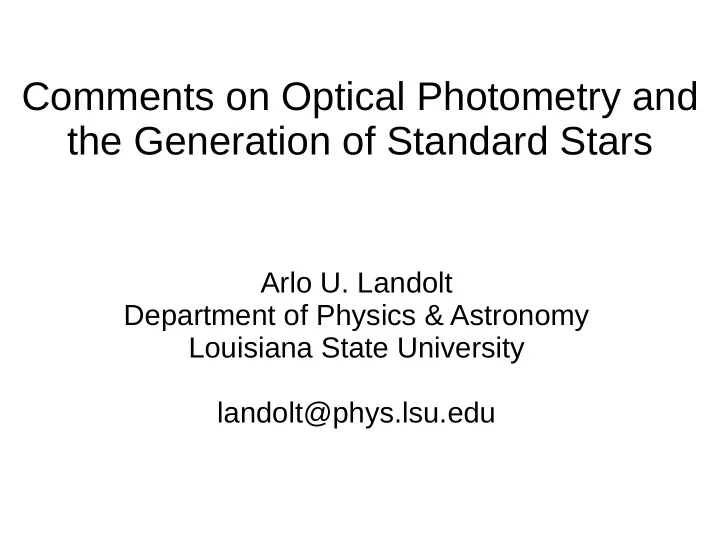

Comments on Optical Photometry and the Generation of Standard Stars Arlo U. Landolt Department of Physics & Astronomy Louisiana State University landolt@phys.lsu.edu
Abstract Comments will be made on situations encountered in the process of observational optical photometry and the establishing of standard star sequences.
Prologue Long term goals for long term needs: ● standards for intensity and color information ● help calibrate new generations of equipment ● looking outward and inward
Introduction ● memory and continuity Weaver Hearnshaw Straizys Bessell Sterken ● goal regarding tie-ins
Setting the Stage ● photometric characteristics a la Johnson ● a role for spectra
Photometry the Old Way ● photography calibrated photoelectrically ● toddler steps ● learning to walk
Photoelectric Photometry at the Celestial Equator ● community's realization of need ● identifying potential candidate stars ● initial standard sequences
Observational Problems ● the environment ● filters and detectors ● cantankerous problems
The CCD Era ● rules for acquiring data ● taking measure of the data ● do the results make sense?
Results Over Time ● standards as a function of time ● standard star characteristics ● photometric accuracies
Number of Standards as a Function of Time Reference # of stars Filters Sky Location Johnson (1963) 104 UBV northern hemisphere Landolt (1973) 658 UBV celestial equator Cousins (1973) 255 UBV E and F regions Graham (1982) 102 UBVRI E regions Landolt (1983) 223 UBVRI celestial equator Menzies et al. (1991) 212 UBVRI celestial equator Landolt (1992) 526 UBVRI celestial equator Landolt (2007) 109 UBVRI -50 degree fields Landolt (2009) 595 UBVRI celestial equator Landolt (2012) hundreds UBVRI +45 degree fields Clem & Landolt (2012) 1000+ UBVRI celestial equator
Summary of Landolt's Standard Star Efforts Year of # of Measures Publication Standards Range in V Range in (B−V) per star 1973 335 10.5 12.5 −0.25 +2.00 11 1983 223 7.0 12.5 −0.30 +2.00 20 1992 217 11.5 16.0 −0.30 +2.00 29 8.9 16.3 −0.35 +2.30 2009 595 24 ~ 9.0 16.0 ~ −0.30 +2.20 2012a hundreds ~15 ~ 10.0 16.0 ~ −0.30 +2.00 2012b 1000+ 25+ 2012c 1000+ ~ 15.0 20.0 ~ −0.30 +1.80 25+
Photometric Accuracies Mean Errors of a Single Observation Mean Errors of the Mean 1973 1983 1992 2009 1973 1983 1992 2009 V 0.0153 0.0134 0.0160 0.0144 0.0046 0.0029 0.0039 0.0036 B−V 0.0159 0.0124 0.0195 0.0191 0.0048 0.0027 0.0048 0.0051 U−B 0.0250 0.0228 0.0439 0.0492 0.0075 0.0050 0.0125 0.0143 V−R 0.0090 0.0126 0.0115 0.0020 0.0031 0.0029 R−I 0.0095 0.0182 0.0166 0.0021 0.0044 0.0040 V−I 0.0116 0.0228 0.0207 0.0025 0.0055 0.0050
Acknowledgments Thanks to James Clem and Chris Sterken for comments Support over the years by DARPA, AFOSR, STScI, and NSF
Recommend
More recommend